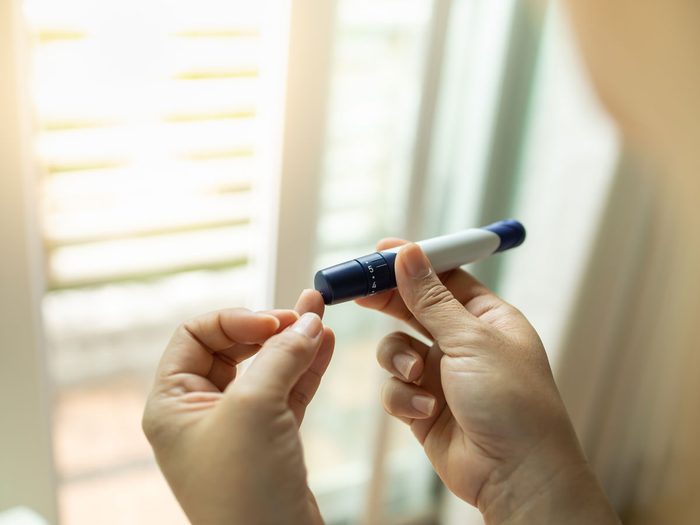
Limiting added sugar from your diet is worth a shot
Sugar has a bad reputation for having a not-so-great effect on the body. If you plan on curbing your sweet tooth and limiting the sweet stuff, you should prepare for both the health benefits and possible, unpleasant short-term symptoms. Here’s everything you need to know about what happens when you stop eating sugar.

You could look younger
Sugar equals wrinkles, says Anthony Youn, MD, a plastic surgeon in Troy, Michigan, and author of The Age Fix: A Leading Plastic Surgeon Reveals How To Really Look Ten Years Younger. “Sugar causes glycation, a process by which the sugar molecules bind to and deform the collagen and elastin in our skin,” he says. Collagen and elastin are the two main proteins that give our skin its youthful, supple properties, so we want to preserve them as much as possible. “Giving up (or reducing) the amount of sugar you eat can also reduce glucose and insulin spikes in your bloodstream, reducing chronic and acute inflammation linked to aging.” You can get your glow on within 14 days of giving up sugar, Dr. Youn says. (FYI: You can actually delay the aging process with these lifestyle choices.)

Your mood may improve
“You might think eating a cookie will make you happy, but sugar consumption has actually been linked to higher rates of depression,” says Megan Gilmore, a certified nutritionist consultant in Kansas City, Kansas, and author of No Excuses Detox: 100 Recipes to Help You Eat Healthy Every Day. “This may be due to the fact that sugar can lead to chronic inflammation, which impacts brain function.” When you cut out sugar, you might feel that fog lift, along with your mood, in just one to two weeks, she says. Research in the June 2015 issue of The American Journal of Clinical Nutrition helps to back this up. Women who consumed foods that ranked high on the glycemic index, including those rich in added sugar, were more likely to be depressed than women who ate fewer of these foods. If you control sugar spikes, you keep your moods in check, confirms Leah Kaufman, MS, registered dietitian at NYU Langone’s Weight Management Program. “Think about a kid on Halloween. After they eat all that sugary candy, they get a sugar high, and then they crash,” she says.

You could lose weight
On average, we consume 22 teaspoons of added sugar a day, which equals around 350 calories, according to a scientific statement from the American Heart Association published in Circulation. “Sugar can be addicting, and when we decrease the amount that we eat, it also stops cravings, so we consume fewer calories and lose weight,” Kaufman says. Eating excess sugar may cause resistance to leptin, a hunger-regulating hormone that signals your body when to stop eating, per research published in Advances in Nutrition. “When you eat refined sugar, your body may not get the signal that you’re full, causing you to consume too many calories and gain weight,” Gilmore says, adding, “When you replace sugar with nourishing whole foods, your hormones will naturally regulate, sending signals to the brain when you’ve eaten enough.” As a result, you may lose weight without trying so hard—often within the first week, she says.

You’ll catch fewer colds
Sugar contributes to chronic inflammation, which lowers our immune system’s ability to fight off colds and flu, Gilmore says. What happens to your body when you stop eating sugar? “You’re likely to have fewer sniffles year-round, and it may also help to reduce your allergy and asthma symptoms too.” A study published in the American Journal of Clinical Nutrition found that eating 100 grams of sugar (whether it was glucose, fructose, sucrose, honey, or orange juice) lowered white blood cells’ ability to kill bacteria by as much as 50 percent—and this effect lasted for up to five hours.

You may lower type 2 diabetes risk
Quitting sugar gives your body’s natural detox systems a chance to do their job. “In the first couple of hours without sugar, your pancreas will start to produce less insulin and your liver will also start to catch up on processing stored toxins,” explains Marc Alabanza, a certified nutritional counselor and program director of GroundSea Fitness, a detox retreat in the Berkshires of Massachusetts. This process will take a little longer if you are already insulin resistant, he adds. Insulin resistance occurs in prediabetes and type 2 diabetes and it means that even though your body produces the hormone insulin, it doesn’t respond to it properly. “The time for most of these symptoms to completely subside can run up to five weeks, at which point one will no longer be a slave to refined sugar,” he says.
Keep in mind, these sneaky foods can cause your blood sugar levels to increase.

You may lower your risk of heart disease
“When glucose spikes after eating sugary food, our insulin increases to compensate for it, and this activates a part of our nervous system which increases blood pressure and heart rate,” Kaufman says. High blood pressure is a major risk factor for heart disease, as is type 2 diabetes and obesity, both of which have been linked to excessive sugar consumption, according to the American Heart Association. Sugar also increases unhealthy blood fats called triglycerides in the blood, which up risk for heart disease and stroke. In one April 2014 study, those who ate the most added sugar were most likely to die from heart disease than their counterparts who consumed the least. (Learn more on how your diet can help control type 2 diabetes.)

You’ll improve your breath and your smile
Your sweet tooth is really anything but sweet when it comes to the health of your smile, says Saul Pressner, DMD, a dentist in New York City. “Sugar is a major cofactor in causing cavities as it interacts with bacteria in your mouth to form the acid that causes decay,” he says. Your breath will also improve as sugar feeds the bacteria that cause bad breath. These benefits will be immediate, and will only get better with time, he says.

You may have better sex
“For men, eating sugar causes an insulin spike that drives pathways that reduce sex drive and function,” explains Mark Hyman, MD, medical director at Cleveland Clinic’s Center for Functional Medicine in Ohio and the Founder of the UltraWellness Center in Lenox, Massachusetts. Sugar also wreaks havoc on female sex hormones, says Dr. Hyman, the author of several books including the 10-Day Detox Diet. This affects more than just sex life and desire, he adds. “It can cause women to lose hair on their head and grow it on their faces, as well as develop acne and irregular periods.”

You’ll sleep like a baby
If it’s loaded in sugar, your midnight snack may rob you of the ability to get good night’s sleep, per Dr. Hyman and research published in BMJ Open. “People can develop low blood sugar and get night sweats if they have a sugary snack before bed,” he says. “Eating sugar before bed can also supercharge stress hormones, which leads to trouble sleeping.” What happens when you stop eating sugar? You will get higher quality z’s within two or three days of kicking the sugar habit, he says.

Stay the course
It’s not necessarily easy to give up sugar, according to Auckland, New Zealand-based doctor Sharad Paul, MD, author of The Genetics of Health: Understand Your Genes for Better Health. “Sugar is addictive and triggers withdrawal symptoms if we stop eating it,” he says. “Mood changes like anxiety and anger usually last for about two weeks, but up to a month if you have been eating a lot of sugar over a long period of time. Even artificial sweeteners like aspartame cause withdrawal effects, so it’s best not to use them as a means to reduce sugar intake,” he says. Alabanza adds that headaches and flu-like symptoms may also occur, and you can reduce them with exercise, he suggests. “A moderate to brisk paced walk or hike can help by slightly increasing circulation and metabolism, boosting the immune system and giving the person something positive to focus on.”
Now that you know what happens when you stop eating sugar, next learn how mindful eating can help you lose weight.
